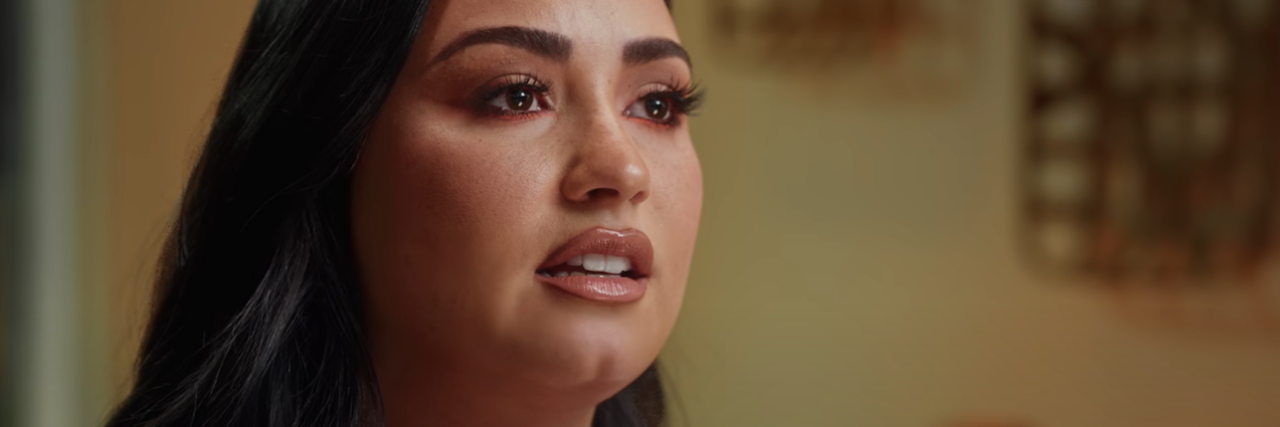Demi Lovato's New Docuseries Will Show the Messiness of Mental Health Recovery
One of the most prominent superstars who has worked hard to destigmatize mental health is Demi Lovato, the former Disney star turned multimedia darling who was diagnosed with bipolar disorder. Now the singer believes her diagnosis was incorrect, telling the New York Times recently she actually lives with ADHD.
A new four-part documentary about her — “Demi Lovato: Dancing with the Devil” — debuts Tuesday on YouTube. The four-part tell-all YouTube Original documentary, the title of which mirrors her upcoming seventh album, premiered last week at the South By Southwest Film Festival. It finds Lovato unearthing all of the pain and tragedy she has experienced — from drug addiction to self-harm to an eating disorder to mental health challenges.
Lovato has been a star since she was 6, beginning as a cast member on the preschool show with the purple dinosaur “Barney” and going on to star in a couple of Disney shows.
More recently, along with releasing six albums — two of which are double platinum — Lovato has built a following of 100 million on Instagram, served as a judge on “The X-Factor,” along with Britney Spears for two seasons, and had a recurring role on the hit music drama “Glee,” which ran for six successful seasons on Fox.
Fellow famed addict Sir Elton John appears as one of the doc’s interviewees and he says in the movie: “When you’re young, and you’re famous, my God it’s tough.”
Tough indeed. The 28-year-old has survived three strokes and a heart attack due to her illicit drug use. And when she woke up in the hospital after a near-deadly overdose on heroin laced with fentanyl in 2018, she suffered brain damage, organ failure, and she was legally blind for a period. When she overdosed, Lovato had been sober for six years, but she was no stranger to treatment.
In fact, she has quite the recovery backstory. Lovato first went to rehab for addiction in 2010 at age 18. The next year, after an anger flare-up on tour with the Jonas Brothers, Lovato’s family and her management company sat her down for an intervention.
She quit the tour and entered rehab at Timberline Knolls, an Illinois facility for women with eating disorders and addiction.
The singer moved into a sober house in 2012, and lived there for about a year to make sure she kept her illnesses in check. Lovato admitted she was self-medicating with alcohol and drugs — particularly cocaine.
She says she had a nervous breakdown during treatment, and that’s when she was diagnosed with bipolar disorder.
“I’m on my ninth life,” Demi says in her new film. “I’m ready to get back to doing what I love, which is making music.”
And she’s been a music-making machine as of late. Lovato has been hard at work on her seventh album, due out April 2. According to the New York Times, the album “has its share of vocal pyrotechnics, but is a far more intimate LP, focused on telling the story of the past several years.” One track — “Melon Cake — features Ariana Grande. She also writes about her current state of mind on the song “California Sober.” However, Lovato is not sober. She allows herself to drink in moderation and smokes weed on occasion.
Like so many artists who struggle with mental illness, it is creativity that is her saving grace.
“Creativity is what helps me escape a lot of my inner demons,” Lovato told MTV News in 2012 when an earlier documentary about her aired on MTV. “Why not air all my secrets? Why not share my story because some people need to hear it?”
Destigmatizing mental illness is a recent trend in Hollywood. Three years ago, Mariah Carey told People that she’d been struggling with bipolar, No one batted an eye. Same goes for pop stars Bebe Rexha and Halsey.
If you’d like to read up on how mental illness and substance abuse are intertwined, check out my book “The Bipolar Addict: Drinks, Drugs, Delirium & Why Sober Is the New Cool.” Lovato has struggled with addiction, bulimia and self-harm.

